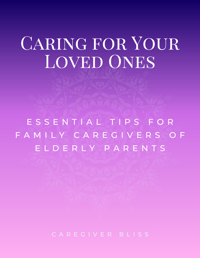Caring for an elderly family member can be both rewarding and challenging. It's a role filled with love, but it can also bring moments of frustration and exhaustion. One vital quality that can make this journey smoother is empathy.
Empathy is the ability to understand and share the feelings of another person. It's a fundamental aspect of caregiving, and though it may not always come naturally, practicing empathy daily can significantly improve the quality of life for both you and your loved one.
Understanding Empathy
Empathy is like a bridge that connects you to the feelings and emotions of your elderly family member. It allows you to step into their shoes, even when you may not feel like it. Here are some essential tips to help you practice empathy daily, even on those challenging days:
Listen Actively
Active listening is one of the most important components of empathy. When your loved one speaks, pay attention not only to their words but also to their tone and body language. Try to understand their feelings and concerns, even if you've heard the same stories many times before.
Validate Their Emotions
It's okay for your loved one to express frustration, sadness, or even anger. Remember that they are going through a challenging phase of life, and their emotions are valid. Instead of dismissing their feelings, validate them by saying something like, "I can understand why you might be feeling this way."
Practice Patience
As a caregiver, you'll encounter situations that test your patience. It's important to remember that your loved one may not always be easy to deal with, but they still deserve your understanding. Take deep breaths and remind yourself of their needs and emotions.
Offer Help without Being Asked
Sometimes, your loved one may not be able to express their needs verbally. Pay attention to their non-verbal cues, and offer assistance without waiting for them to ask. This shows that you care and can be a great way to demonstrate your empathy.
Share Their Joy
Caregiving isn't just about addressing problems; it's also about celebrating the good moments. When your loved one experiences happiness or joy, share in those feelings with them. By doing so, you create a strong emotional connection.
Educate Yourself
Empathy can be enhanced through understanding. Learn about the specific health challenges your loved one is facing. Knowing what they're going through will help you better relate to their experiences.
Seek Support
Caring for an elderly family member can be emotionally draining, so don't hesitate to seek support from friends, family, or support groups. When you're emotionally well, you can provide better care and empathy.
Take Care of Yourself
Remember that you're a person with your own needs and emotions. It's crucial to take breaks and engage in self-care activities to recharge your empathy reserves.
Conclusion
Caring for an elderly family member is a noble and often demanding responsibility. Empathy is your most potent tool in providing them with the support and understanding they need, even on days when you don't feel like it. By actively listening, validating emotions, and practicing patience, you can create a loving and supportive environment for your loved one.
Remember that seeking help, educating yourself, and taking care of your own well-being are also essential components of being a compassionate caregiver. Empathy may not always come easily, but with practice and dedication, you can make each day a bit brighter for your elderly family member.
We'd love to hear from you! Share your experiences and insights as an elderly family caregiver. How do you foster empathy and compassion in your daily caregiving routine? Your comments can provide valuable support and inspiration to others in similar situations. Join the conversation, and let's create a community of understanding and compassion.
Free Guide:
Caring For Your Loved Ones
 Attention family caregivers! Are you struggling to provide the best care for your aging parents? Don't worry, we've got you covered.
Attention family caregivers! Are you struggling to provide the best care for your aging parents? Don't worry, we've got you covered.
Download our free guide, Caring for Your Loved Ones: 10 Essential Tips for Family Caregivers of Elderly Parents, and unlock the secrets to becoming an exceptional caregiver.
From adapting the home environment to promoting independence, this invaluable resource will transform your caregiving experience into a more rewarding journey. Don't wait—give your loved ones the care they deserve, and download your free copy today!

